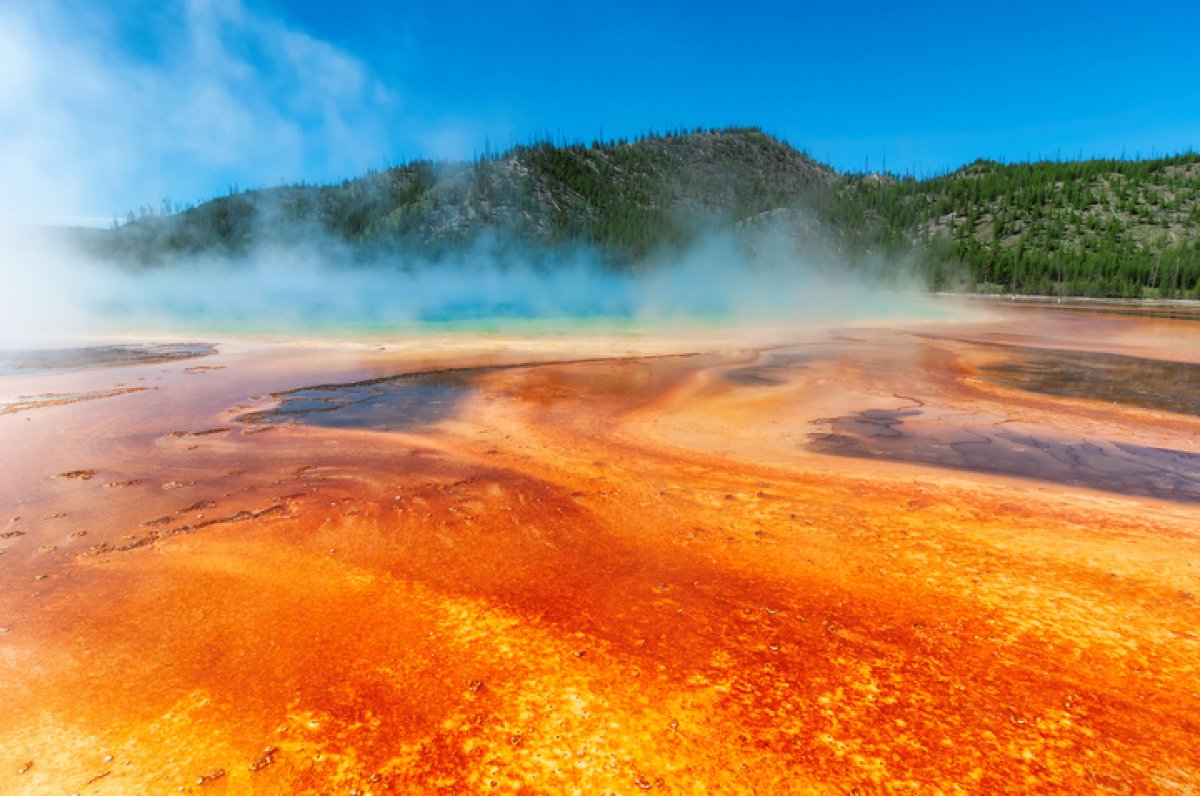The biggest super-eruption ever to be recorded at Yellowstone volcano has been discovered by scientists, finding an event that took place 8.7 million years ago covered an area the size of New Jersey with searing hot volcanic glass.
The eruption, which researchers have called the Grey's Landing super-eruption, was around 30 percent larger than the previous record holder. Material from the eruption covered an area of around 8,800 square miles—an area around the size of New Jersey—making it "the largest and hottest documented eruption from the Yellowstone hotspot," scientists wrote in the journal Geology. The eruption took place in what is now modern-day southern Idaho.
The Grey's Landing super-eruption is one of two newly identified eruptions at the Snake-River–Yellowstone volcanic province. The other, the McMullen Creek eruption, took place around nine million years ago and was larger than the last two major eruptions at Yellowstone. It covered an area of over 4,600 square miles.
A team of researchers led by Thomas Knott, a volcanologist at the United Kingdom's University of Leicester, were examining volcanic deposits previously thought to have been produced during multiple, smaller eruptions. By combining different techniques to analyze the rocks, including mineral chemistry, paleomagnetic data and field characterizations, they discovered that the deposits belonged to "colossal colossal sheets of volcanic material from two previously unknown super-eruptions," Knott said in a statement.
"The Grey's Landing eruption enamelled an area the size of New Jersey in searing-hot volcanic glass that instantly sterilized the land surface. Particulates would have choked the stratosphere, raining fine ash over the entire United States and gradually encompassing the globe." Anything located in this area at the time of the eruption would have been vaporized. "It is one of the top five eruptions of all time," he said.
He told Newsweek the eruption may have been even larger, but the team had chosen to "remain conservative" in their sizing as they had not yet identified products from the eruption that had been flung even further.
Researchers say the findings increase the number of known super-eruptions from the Yellowstone hotspot. The last explosive eruption at Yellowstone took place around 640,000 years ago. Since then, around 80 "relatively nonexplosive" eruptions have taken place, the USGS says.
The latest findings, scientists say, suggest our understanding of the timings of Yellowstone's super-eruptions needs to be revised—and that the hotspot may be "waning." The discovery of two super-eruptions during the Miocene, an epoch that lasted between 23 and 5.3 million years ago, suggests that at this time Yellowstone produced large explosive eruptions every 500,000 years.
There have been two major eruptions at the Yellowstone hotspot in the last three million years, putting the current rate of super-eruptions at one every 1.5 million years. "This is a very significant decline," Knott said in a statement.
"The size, frequency, and emplacement temperatures of the super-eruptions have decreased with time," the researchers wrote. "Together, these features indicate that the hotspot activity may be waning."
Knott told Newsweek it is difficult to say if Yellowstone will ever become dormant. "It isn't right now and i think that is the most important point at present and requires constant monitoring by the USGS. We pose the idea that it may have been in decline since the mid-late Miocene," he said. "This is not to say that nature could not suddenly 'ramp up' it's activity. However, myself and colleagues are certainly interested why these declines have occurred over time and definitively what that means."
Michael Poland, Scientists-in-Charge at the Yellowstone Volcano Observatory, who was not involved in the research, said the latest findings were "neat" and that the study shows "there is still more work to be done sorting out the eruptive history of past volcanic centers on the Yellowstone track."
"By doing such careful work, the authors were able to correct some misinterpretations and also tell an interesting story about the eruptive history of some of these older centers," he told Newsweek.
"In terms of the hotspot 'waning,' that's certainly an interesting outcome of the work, but it's not a completely new idea. Plate motion is bringing the hotspot into areas of colder and thicker crust, which probably makes it harder to generate and transport magma. We might expect a waning of the activity over time anyway due to this fact."
Knott said the team now hopes to better understand how the system has evolved over time and why it was so much more violent in the past compared to the present day. "We also wish to continue our assessment of the size, reach and global effects of theses newly discovered super-eruptions. There are suggestive ash records in localities around the globe of similar age that are yet to be allocated to a particular eruption by name.
"Perhaps Grey's Landing ash is just lying in wait around the globe for us or others to correlate and identify."
This article has been updated to include quotes from Michael Poland.

Uncommon Knowledge
Newsweek is committed to challenging conventional wisdom and finding connections in the search for common ground.
Newsweek is committed to challenging conventional wisdom and finding connections in the search for common ground.
About the writer
Hannah Osborne is Nesweek's Science Editor, based in London, UK. Hannah joined Newsweek in 2017 from IBTimes UK. She is ... Read more
To read how Newsweek uses AI as a newsroom tool, Click here.








